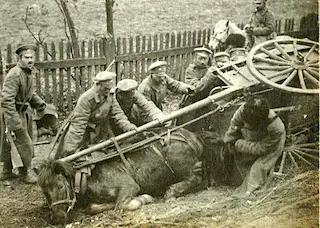To ‘put your shoulder to the wheel’ is to respond to a problem by applying oneself and making your best effort. It is similar in meaning to ‘get stuck in’.
Put your shoulder to the wheel
What's the meaning of the phrase 'Put your shoulder to the wheel'?
What's the origin of the phrase 'Put your shoulder to the wheel'?
Of course, in trying to understand this proverbial expression and where it came from, we need to know what wheel was being referred to.
Fortunately, that isn’t difficult to determine as all the early uses of the proverb refer unambiguously to cartwheels.
The expression dates from the 17th century. At that time the wheels on wooden carts and carriages were large, quite big enough to get your shoulder behind.
Roads were rutted and muddy and carts often got stuck and overturned. There was no breakdown service to call – the only recourse was to turn the cart upright and heave against the wheels to make some forward progress.
The first use of the proverb in print that I can find is in the English scholar Robert Burton’s medical textbook The Anatomy of Melancholy, 1621:
To pray alone and reject ordinary meanes, is to doe like him in Aesope, that when his cart was stalled, lay flat on his backe and cryed aloud helpe Hercules, but that was to little purpose, except as his friend advised him, rotis tute ipse annitaris, hee whipt his horses withall, and put his shoulder to the wheel.
That extract refers to Aesop’s story The Countryman and Hercules. The gist of the story is that a waggoner gets his cart stuck in mud and calls on Hercules to help him, having made little effort to free the cart himself. Hercules berates him to make every effort to fix his own problem.
The earliest translations of Aesop’s Fables into English date from the 15th century. The early texts include ‘get stuck in’ advice from Hercules, but ‘put your shoulder to the wheel’ isn’t a literal translation of the original.
Burton took the moral of Aesop’s tale and from it coined the expression himself.
It’s worth noting that, as well as coining this expression, Burton was a medical pioneer. His text was written for those suffering from melancholy, what we now call depression. As a lifelong depressive himself he advanced medical science significantly with his writing. He gave sufferers much useful advice and a new ‘inward’ way of viewing the condition, which was until then believed to be caused by ‘black bile’.
See other ‘put’ phrases”
Related phrases and meanings
Browse more Phrases
About the Author

Phrases & Meanings
A-Z
A B C D E F G H I J K L M N O P Q R S T UV W XYZ
Categories
American Animals Australian Bible Body Colour Conflict Death Devil Dogs Emotions Euphemism Family Fashion Food French Horses ‘Jack’ Luck Money Military Music Names Nature Nautical Numbers Politics Religion Shakespeare Stupidity Entertainment Weather Women Work
How did we do?
Have you spotted something that needs updated on this page? We review all feedback we receive to ensure that we provide the most accurate and up to date information on phrases.
